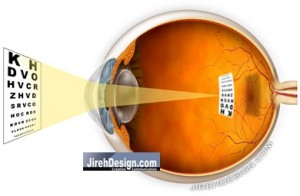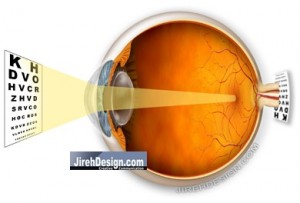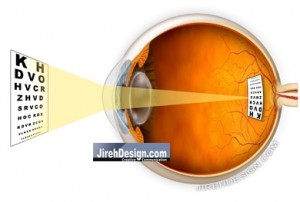31 Mar Why Glasses Won't Help You See
“Will glasses help?” We often wonder if “correction” will help decreased vision in the presence of retinal disease such as macular degeneration and diabetic retinopathy. Spectacles can only help so much yet won’t “reverse” the loss of vision from the disease. This is opposite to those people who claim they are “blind,” yet with glasses see quite well.
How do Glasses Work?
The goal of corrective lenses is to focus an image, sharply, on the surface of your retina (technically the macula). If you are nearsighted (myopic), the image of what you see falls short, or in front, of the macula.
Glasses are used to refocus the image on the retina. This is exactly like a projector focusing on a movie screen.
If you are farsighted (hyperopic), the image actually is focused behind, or past, the macular surface and glasses are used to move the image forward onto the retina.
What is the Macula?
The macula is the functional center of the retina. It measures only about 1.5 mm X 1.5 mm, yet it gives us all of the attributes of our “sight.” It provides us our best color vision, central sight for reading and watching TV and is the only part of the retina sensitive enough to “see” 20/20.
Will Glasses Work?
If there is macular disease, such as diabetic retinopathy or macular degeneration, even properly measured glasses won’t work.
The vision is decreased due to the macular disease. It simply isn’t capable of “seeing” 20/20. The disease is preventing the retina from working to its full potential.
When glasses are working, the image is properly focused on the retina, but the retina is not working well.
Low Vision Aids
It may now make sense why “low vision” aids don’t simply correct for the disease. Low vision aids may be useful by enlarging the image focused on the retina. It may make the image easier to “see,” but the disease is still present. Sometimes, images can be focused to the side of the diseased macula, but these “para-macular” areas are not as sensitive as the macula itself.
In all cases, vision is compromised.
What Does This Mean?
When we speak of decreased vision, implicit in our discussion is the assumption that the proper glasses, or contacts, are being used. The eye is a pretty remarkable optical system, and in most cases, it is pretty routine to find the right lens to help correct myopia, hyperopia and astigmatism.
The optical system can’t correct for disease. while the unit may be functioning properly, that is, focusing an image precisely on the retina, the disease will always win.
This is true of macular disease, glaucoma and some cataract.




![Reblog this post [with Zemanta]](http://img.zemanta.com/reblog_e.png?x-id=40c2eaa2-9fb3-45ea-8642-f9bc3bba2c04)
Rita Rodriguez
Posted at 11:35h, 26 JanuaryIs there any new treatments for myopic degeneration available besides the Avastian injections?
Randall V. Wong, M.D.
Posted at 10:42h, 30 JanuaryDear Rita,
No, there are no new treatments per se. The actual problem, that being slow progressive loss of central vision, has no treatment. Avastin is used only for those situations where neovascularization has developed underneath the macula and has proven to be a godsend.
In other words, unless there is neovascularization, similar to the wet form of ARMD, there is no treatment for myopic degeneration, including Avastin.
I hope this was helpful.
Randy
tiffani
Posted at 17:52h, 24 DecemberHi Randy,
I just go through taking my ten year old daughter to the eye doctor for an exam, and he said that he is not able to help her see past 20/40 rt eye and 20/60 in the Lft eye, he said that she needs to see a specialist, I was wondering what could be the possible problems of someone not being able to see, and glasses not being able to help?
Thank You
Randall V. Wong, M.D.
Posted at 07:55h, 30 DecemberDear Tiffani,
I would recommend that she see a pediatric ophthalmologist. There are too possibilities causing her symptoms. I’d hate to worry you unnecessarily by my guessing as to the actual causes.
Please stay in touch.
Randy